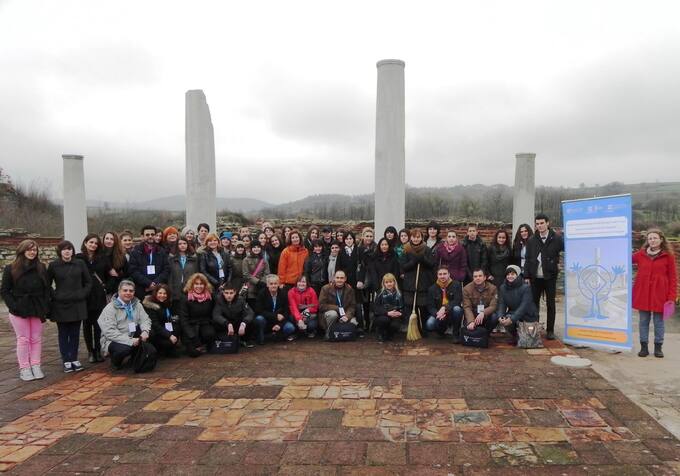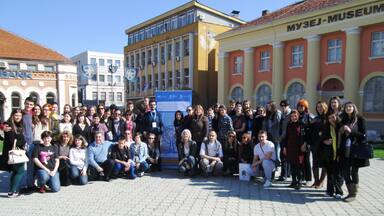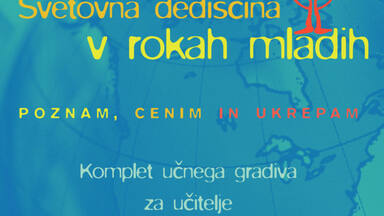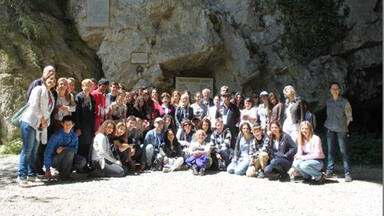
The Second SEE World Heritage Youth Forum for peace and sustainable development was held from 6th until 11th April 2013 in Zajecar, Eastern Serbia, where the World Heritage site Gamzigrad – Felix Romuliana / Palace of Galerius is placed.
At the Official Opening Ceremony on Saturday, 7th April, the Address by Mrs. Irina Bokova, the General Director of UNESCO, has been delivered by Mrs. Vesna Vujičić-Lugasi, Chief of Communication, Education and Partnership Unite of the UNESCO World Heritage Centre. The speech stated that: "Our theme today is forward looking -- Peace and Sustainable Development. This relates to the benefits peoples can gain from living in peace, preserving their heritage and caring for the heritage of their neighbors, while making sure that this heritage contributes to the sustainable development of their living environment and their future. Young people carry this future in their hands.” Mr. Bratislav Petkovic, Minister of Culture and Information of the Republic of Serbia has stated in his speech that “Exactly this Forum represents the platform within which young people from 13 countries from the region could exchange their experiences, positions and opinions, but also share their ideas about the future of the heritage and philosophy of protection”. Participants have also been greeted by Mr. Boško Ničić, Mayor of the City of Zajecar, Mrs. Jasna Zrnović, Secretary General of the National Commission for UNESCO of the Republic of Serbia, Mrs. Carmẻla Quin, Focal Point for World Heritage Education and Mr. Milorad Kondić, President of the United Nations Association of Serbia.
Background
This meeting represents the continuation of the process of the regional youth cooperation, which has been commenced by the "First South East Europe World Heritage Youth Forum – World Heritage Education: Networking for a Better Common Future“ which was held from 21st until 26th May 2011 in Croatia and Slovenia. Youth heritage education provides effective means of safeguarding and promoting cultural diversity, with full respect for each other’s heritage, as a platform for establishing a genuine cultural dialogue in South-East Europe and demonstrate culture and cultural diversity as fundamental components of sustainable development. The involvement of youth and educators in safeguarding and enhancing the promotion of cultural and natural heritage serves as a vector for reconciliation and a catalyst for regional cooperation.
Organizers
The organizator of the Forum has been the United Nations Association of Serbia, in cooperation with the National Commision for UNESCO of the Republic of Serbia, with the support of the World Heritage Centre from Paris and the UNESCO Venice Office. The Project has been organized within the UNESCO Participation Programme.
Participating countries
This Forum has gathered 70 participants, experts, guests and members of the organizing team. Thirty two students (age 13-18) and twenty teachers/educators, from twelve countries have participated in this Forum: Albania, Bosnia and Herzegovina, Bulgaria, FYR Macedonia, Montenegro, Greece, Croatia, Cyprus, Hungaria, Romania, Slovenia and Serbia.
Objectives
In the medium and long term:
- to increase intercultural dialogue and cooperation in the region
- to introduce and implement WH education into school curricula
- to empower students and educators for developing and running intercultural projects in SEE region
- to involve parents in the heritage education for sustainable development.
In the short term:
- to provide students with knowledge and some basic skills related to WH preservation and deepen their understanding on sustainable development and youth project management
- to provide space for people to get to know each other's tangible and intangible heritage
- to create conditions for joint projects among participating countries, for heritage education involving school communities: students, parents and educators
- to introduce the Kit: World Heritage in Young Hands and to enable educators via training to develop and implement strategies that allow students to act and protect cultural and natural sites in their countries, as well as in the wider world
- to identify ways and means in which world heritage could play a role for sustainable development involving all school community.
Activities
Within the Programme different activities have been organized: Plenary Sessions and Group activities regarding the basic topics of the Forum, workshops and practical activities for students regarding the World Heritage protection, teacher working groups regarding to the implementation of the World Heritage Education in the school curricula, presentations of the projects for cooperation, national presentation of the culture of participating countries, as well as visits to the site on the World Heritage List Gamzigrad-Romuliana / Palace of Galerius, and the Negotinske pivnice site, which is on the UNESCO Tentative List.
Main topics of the Forum have been represented by the World Heritage experts and UNESCO representatives:
- Development of the World Heritage Convention
- Links between education, World Heritage and Sustianable Development
- The role of youth in the preservation and protection of the World Heritage
- Training for teachers regarding the implementation of the World Heritage in Young Hands kit in the school curricula.
Workshops and practical activities for students have referred to the issues of the World Heritage protection, and were led by the experts: - Hands-on practical mosaic artwork - Hands-on painting artwork - Hands-on practical work on the site Gamzigrad – Romuliana, Palace of Galerius - Hands-on pottery artwork - Youth Model of the World Heritage Committee - educational simulation - World Heritage Quiz.
The Results
At the Closing Plenary Session, recommendations of the Teacher Working Group and Student Working Group have been adopted. Participants have stated in the debate and their evaluation forms that the Forum has made significant achievements: - Drafts of the intercultural projects within the field of the World Heritage in involved schools have been prepared, and students have gained knowledge and skills for their implementation. - Teachers have been enabled and motivated for implementation of the World Heritage in Young Hands kit in the school curricula - Strategies for implementation of the topic sustainable development and the World Heritage Education have been planned - The organizer has established tools for the future communication and cooperation between participants: Facebook group, website of the Forum, interactive Internet platform for project presentation.
The Forum has given a strong impulse for cooperation within the schools in the region of the South East Europe, which shall contribute to rising of the awareness of students and teachers in the region regarding the importance of the World Heritage protection. It is expected the successful and active implementation of the World Heritage Education Programme in participating countries, followed by deeper understanding of the topic and current activities for sustainable development, as well as the contribution of the intercultural dialogue and better understanding among young people in the countries of the South East Europe.





